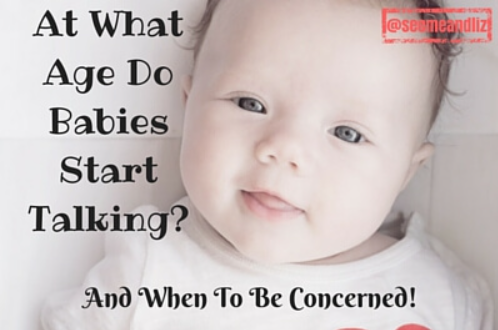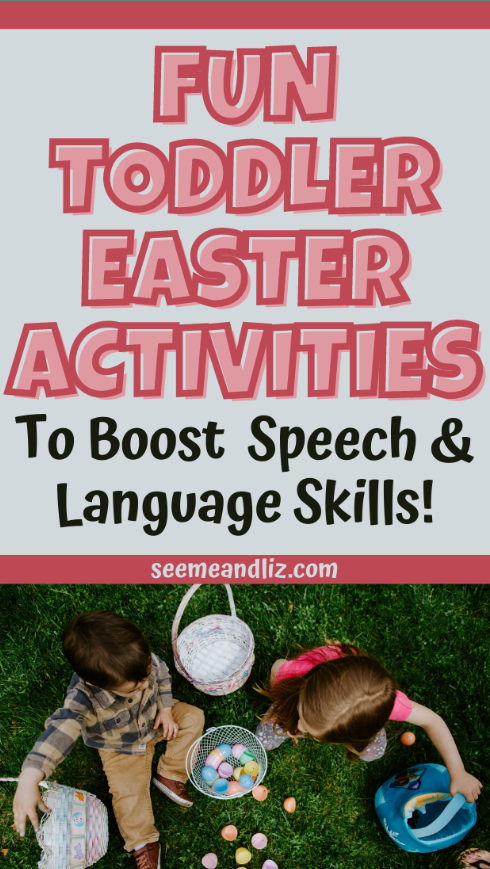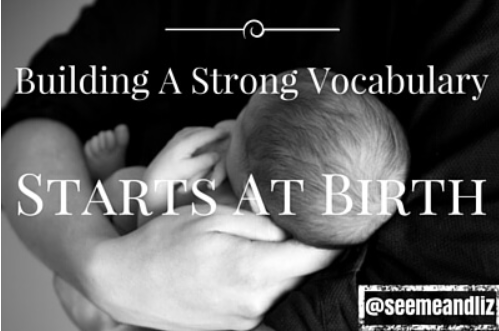As with all other developmental milestones, the age at which babies start talking will vary from one child to the next. However, language development, including vocabulary size, is one of the best indicators of future success (including academics). Therefore it is important to be aware of the language development hierarchy.
For those of you that really want an answer to the question of this article, the average age that babies will say their first word is 12 months. Please don’t worry if your 12 month old doesn’t have any words yet. Remember, this is the average age. There are many skills that your little one needs to acquire before spoken words will be heard.
Let’s take a look at some of the skills a baby must have in place in order to start talking. If your 12 month old has these skills, words will follow soon. Continue reading for tips to develop these skills if your child is struggling.
Non-Verbal Language Skills Needed Before A Baby Can Talk
Eye Contact
Starting from birth, babies should start making eye contact with those most familiar to them (parents and close caregivers). You will often see a baby looking intently at her father as he speaks or sings to her. This is a very important skill, not just from a social perspective, but also for language development. As your baby grows and can make eye contact more often, she is looking at your mouth and eyes and obtaining cues about emotions and the different sounds used to make up words.
Joint Attention
This is important from both a social and language development perspective. A child needs to have a reason to communicate and this starts with joint attention. This skill becomes solidified after about 9 months of age when babies are regularly seen pointing to an object, event, person, etc., then looking back at their caregiver and then once again looking and pointing at the object. This simple activity shows that baby understands communicative intentions.
Gesturing
Babies typically begin to use gestures as a form of communication around 8 months. A few good examples are clapping (to indicate being happy or excited), waving, pointing, arms up (indicating wanting to be picked up), blowing (perhaps indicating wanting mom/dad to blow some bubbles), reaching out and opening/closing hand to request something, blowing kisses, etc.
Copying and Imitation
This is typically seen in babies that are 8 months and older. Babies will begin imitating actions such as clapping, waving, blowing kisses, etc. Babies will also imitate simple vocalizations such as “bababa” and “dadada” or coughing, raspberries (putting lips together and blowing, making a sound like “brrr”), smacking lips, etc.
These kinds of imitation start out social in nature. It is a way for a baby to interact with their parent/caregiver. However, it is also a precursor to spoken language. Babies learn from a young age that conversation is give and take. But by copying an adult’s vocalizations, the baby is also learning complex mouth movements that will later help him form words and sentences.
Turn Taking
I touched on this a bit above, but I want to give you some more information. This skill is one of the earliest to develop. Parents begin to interpret their baby’s noises, cries, smiles, movements, etc. As baby grows parents may begin leaving pauses to see if their baby will respond with a sound, action or smile. Eventually this give and take results in true turn taking which is necessary to carry on a conversation!
Understanding
Your baby’s first year will be filled with information gathering. Before a child can speak, she must understand the words she is hearing. This is why it is very important that you narrate as you go about your day. Talk to your baby about what you are doing. She may not understand everything right now, but she soon will. Babies and toddlers need to hear words hundreds of times before they will start using them themselves. This is probably why “no” is often a first word for many children!
It’s ok to talk to your baby the way you would talk to another person. You do not need to use immature grammar. Using inflection and intonation in your voice is great because it really draws attention to the sounds in the words you are using. Try using real words as much as possible and avoid made up babyish terms such as “tata” (give me). That being said, vocal play with a baby is perfectly fine. What this means is that you can look at your little one and say “babababa” or something like that. But this would be done playfully, and hopefully once your baby is closer to 6 months she may start imitating some of these sounds.
Your baby should understand the word “no” by about 12 months old. Prior to this you will see understanding when you call her name and she turns her head towards you. After 12 months, a baby can understand simple instructions/questions such as “where is the ball?” or “show me your shoe”.
If you are concerned that your 12 month old does not have any words, here are some red flags to be on the lookout for.
Red Flags
- flat affect or no smiling when interacting with parents or caregivers
- not responding to name when called by 10-12 months
- no back and forth imitation of sounds or actions by 9 months
- not understanding a simple instruction such as “show me your foot” by 12 months
- difficulty making eye contact by 6 months
- no babbling by 12 months
- unable to point (or use other gestures) by 12 months
- If you feel that your 12 month old has 2 or more of these red flags, please contact a registered speech-language pathologist in your area.
Suggestions and Activities To Help Strengthen Non-Verbal Language Skills
Talk Often
Talk to your baby, label objects you see, describe what you are doing. Make silly sounds, pause and wait. Give your baby the chance to respond by either vocalizing, gesturing or changing her facial expression.
Point and Gesture
Point to different items around your house. Go up close and look at the item, label it, and then look to your baby for confirmation. Do this frequently. Your baby should soon start trying to draw your attention to something he is interested in.
Use gestures in addition to pointing. For example, if you know your baby wants to be picked up say something like “ok, I will pick you up” while lifting your arms up as you are walking to your baby.
♥ Related Reading: Baby Sign Language Basics – What you need to know! ♥
Keep Your Language Simple
But, this does not mean use made up words or incorrect grammar (telegraphic speech). Try and avoid phrases like “tata to mommy”. Instead say “give it to me”. Those are all still simple words and there are only 4 words in that phrase. However, you are modeling correct grammar.
Make Eye Contact
If your little one has a special toy, hold it up to your face to encourage her to look at you. Play games like “peek-a-boo” and say “I see you” every time you or baby pull the blanket away. Point to your baby while saying “I see you”.
Intonation/Inflection
Talking to a baby in a sing song voice is often referred to “motherese” or “baby talk”. Changing the tone of your voice and varying your pitch helps maintain a baby’s attention.
Read Together
Reading is a wonderful way to bond with your baby. But it is also a great way to build language skills. Find simple books with few words. And you can always make up your own story. Point and label pictures. Look from the book to your baby while you are talking. Vary your pitch and intonation to keep your little one’s attention. If your baby allows it, take his index finger from time to time to show him how to point to pictures (for babies over 10 months).
Action Songs and Poems
Sing songs/poems like “The Wheels On The Bus”, “Itsy Bitsy Spider”, “If You’re Happy And You Know It”, etc. There are many others, or you can make up your own songs with actions. Do the actions while your baby watches. After hearing/seeing a song many times your baby will start repeating simple actions such as clapping.
Turn Taking Games
Once your baby is sitting independently roll a ball to him and encourage him to roll it back to you. Make sure that you make eye contact with your little one and talk about what you’re doing. For example “here comes the ball”, “you caught the ball, yay!”, “now roll the ball back to me”, “my turn”, “your turn”, “you have the ball”, etc. You could do a similar activity with blocks as well. Take turns stacking a block to build a tower. There are many simple turn taking games you can play with babies.
Follow Your Child’s Lead
If your baby is interested in a particular toy, game or book, talk about it a lot. Point and make eye contact. Since your child is already interested he will be more likely to learn new skills.
Final Thoughts
Remember, the average age that babies start talking, by talking I mean say their first word or 2, is around 12 months. If your baby (12 month old) is babbling, making eye contact, responding to her name, showing joint attention, using gestures and pointing but does not have any words, keep doing what you are doing. I am sure he will start speaking in no time.
♥ Related Reading: What Is A Late Talker? The Truth Revealed! ♥
If by 16 months your little one still does not have any words, then it is time to have an assessment done by a registered speech-language pathologist. To rule out any possible hearing issues, you can also take your child to an audiologist. But call first and make sure he or she works with babies and children as the testing is different than with an adult.
Please share any comments or questions below!

Our partners











